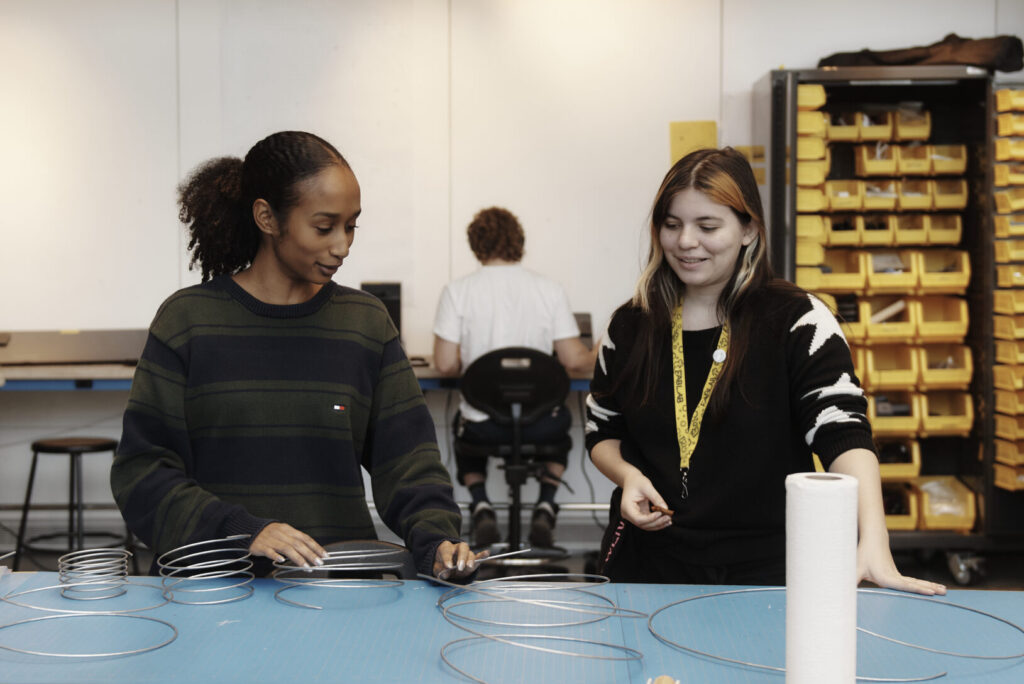PROFESSIONAL AND STUDENT ARCHITECTURAL ASSOCIATIONS
- American Institute of Architects (AIA)
- American Institute of Architecture Students (AIAS)
- National Association of Minority Architects (NOMA)
- Society of American Registered Architects (SARA)
- Association of Collegiate Schools of Architecture (ACSA)
- National Council of Architectural Registration Boards (NCARB)
- National Architectural Accrediting Board (NAAB)
- Boston Society of Architects (BSA)
LICENSURE
The National Council of Architectural Registration Boards, NCARB, provides information on architectural licensure. NCARB’s Architectural Experience Program (AXP) provides resources for, and an app to use in reporting, professional experience hours with supervising professionals which are required for licensure in most US jurisdictions. Find information on the AXP and download the app at: Gain AXP Experience and My AXP App.
M.Arch Program Director Paul Hajian MassArt’s AXP/Licensing Advisor. Paul works closely with students and MassArt’s Career resources office to identify job opportunities for students and recent graduates, and guides students through the internship and licensing exam registration. Paul may be reached at phajian@massart.edu.
STUDIO CULTURE POLICY
The Department of Architecture is committed to teaching through the studio model. Working in studio should be interactive, collaborative, and rewarding. The following topics address goals that graduate students have set for themselves concerning studio culture in order to maintain a respectful and supportive environment.
STUDIO SPACES & STUDIO COURSES
Studio spaces are intended as a gathering area for informal learning, formal lectures, and as a place to work. Though it is not enforced, students are expected to work in studio as much as possible, both during studio classes and on their own time. Since the exchange of ideas works best when all participants are there to contribute and collaborate, students should make every effort to attend studio meetings, critiques, and lectures on time. Late arrivals and early departures are disruptive and disrespectful to the teachers and fellow students.
WORKPLACE & PROFFESSIONALISM
Students are expected to respect each other’s studios, work, and equipment. Ask before borrowing equipment or supplies, and always return items promptly. They must also respect the need for a quiet work environment; use headphones when listening to music, or ask your neighbors for permission before using speakers; and turn off cell phones or set them to vibrate during class and studio hours.
We recognize that students spend a majority of their lives in the studio. They are to be mindful of food in storage, eating, and cleanup so problems do not arise related to cleanliness. They must also pay special attention to food in the shared refrigerators and clean it out occasionally.
As there are a limited number of school computers, they must be shared, if necessary. While students are free to save their work to the desktops, it is advised that they back up their work each day. Recreational use of the computer is a low priority.
When leaving studio at year’s end, students must leave spaces clean and free of personal items. Clean-up dates are posted in studio. Work left after those dates is destroyed.
STUDIO ETIQUETTE
The Department of Architecture supports an interactive learning environment where diverse opinions, approaches, and passionate debate are encouraged. However, intimidation, loud shouting, and insulting speech are not tolerated. Like other areas of MassArt, our studios and classrooms should be free from harassment, discrimination, and violence. Students and faculty will treat one another with respect and mutual goodwill, and will resolve differences in an equitable, respectful manner. The faculty, staff, and students are inter-dependent and together build the Department of Architecture.
BALANCE
It is critical that students are able to maintain a balance between their studio work, assignments for other classes in other departments, and lives outside of school. Excessive time spent in studio that precludes participation in extracurricular activities or enrollment in classes taught by this or other departments is strongly discouraged.
TIME MANAGEMENT
Spending inordinate hours in studio is less effective than investing well-considered quality time on work. Students are encouraged to manage their time so that projects are spread out over the course of a semester in manageable time blocks. Students are discouraged from working late at night on a regular basis and prior to reviews. Working fewer, more productive hours will leave time for other important activities both at school and outside of school.
COMMUNITY AND RESPONSIBILITY
The Department of Architecture is not the only school on campus to provide studio space; graduate studios are shared by numerous departments. Agendas and work styles may differ, but everyone deserves respect. Collaboration with students in other departments – such as faculty-led workshop electives or individually directed projects – is encouraged.
MASSART CAREER DEVELOPMENT
- First Time Undergraduates
- Transfer Students
- Re-admission Candidates
- International Students
- Graduate Students
- Certificate Students
- Resources for Veterans
- Admissions Policies
- Meet the Admissions Team
- Admissions Events
- Resources for Teachers & Counselors
- Accepted Students
- Schedule Your Visit
- Request Information









